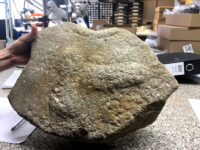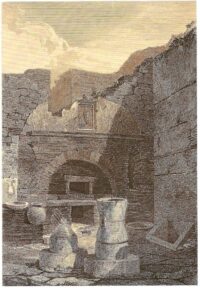 A rare Roman millstone engraved with a phallus was discovered during highway expansion work in Cambridgeshire. It was unearthed in 2017-2018, but the was the phallus relief was not recognized until post-excavation cleaning and documentation. As utilitarian objects, millstones were rarely decorated. Of the 20,000 archaeological millstones and querns unearthed in Britain, only four are decorated.
A rare Roman millstone engraved with a phallus was discovered during highway expansion work in Cambridgeshire. It was unearthed in 2017-2018, but the was the phallus relief was not recognized until post-excavation cleaning and documentation. As utilitarian objects, millstones were rarely decorated. Of the 20,000 archaeological millstones and querns unearthed in Britain, only four are decorated.
Archaeologist MOLA Headland Infrastructure and its partner Oxford Archaeology examined the millstone.
They discovered two crosses inscribed on the circumference of the quern, a simple hand mill for grinding corn, typically consisting of two circular stones.
They also found the phallus carving on its upper face.
The millstone had been broken during its use and was then adapted, which preserved the carvings as it was then reversed to be used as a saddle quern, one of the bed stones used in the grinding process, hiding the genital carving.
Phalluses were widely used in the Greco-Roman world as apotropaic symbols, talismans to ward off evil. The powers of the fascinus, the erect phallus, sometimes winged, were deployed for personal protection in the form of pendants, to fend off trespassers and welcome the well-intentioned at boundaries and over doorways, to shield against danger in public baths and to guard valuables and businesses from the Evil Eye of the envious. The higher the value, the greater the risk from envy, and anything associated with wealth and pleasure was at particular threat from the envious. As both a great pleasure and a necessity of life, food was in critical need of protection.
 The phallic symbol’s most obvious connotation was fertility which was bound to the idea of proliferation, fecundity, productivity. Thus a phallus played multiple roles for a business. It warded off evil while drawing in luck, happiness and prosperity. Pompeii provides a stellar example of this confluence in the carved relief of a phallus with the inscription “His Habitat Felicitas” found above a bakery. Felicitas means both happiness (as in “felicitations!”) and luck (as in “felicitous”), from the root word “felix” meaning “fertile.” There’s an additional layer of association between the phallus as inseminator and grains, themselves symbols of fecundity.
The phallic symbol’s most obvious connotation was fertility which was bound to the idea of proliferation, fecundity, productivity. Thus a phallus played multiple roles for a business. It warded off evil while drawing in luck, happiness and prosperity. Pompeii provides a stellar example of this confluence in the carved relief of a phallus with the inscription “His Habitat Felicitas” found above a bakery. Felicitas means both happiness (as in “felicitations!”) and luck (as in “felicitous”), from the root word “felix” meaning “fertile.” There’s an additional layer of association between the phallus as inseminator and grains, themselves symbols of fecundity.
Dr Ruth Shaffrey, from Oxford Archaeology, said: “As one of only four known examples of Romano-British millstones decorated this way, the A14 millstone is a highly significant find.
“It offers insights into the importance of the mill to the local community and to the protective properties bestowed upon the millstone and its produce (the flour) by the depiction of a phallus on its upper surface.”